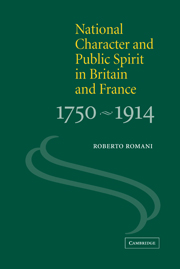Book contents
- Frontmatter
- Contents
- Acknowledgements
- List of abbreviations
- Introduction
- Part I 1750–1850
- 1 All Montesquieu's sons: the place of esprit général, caractère national, and mœurs in French political philosophy, 1748–1789
- 2 After the Revolution: Staël on political morality
- 3 From republicanism to industrialism and national character: Melchiorre Gioja, Charles Dupin, and Continental political economy, 1800–1848
- 4 The French Restoration dispute over mores and Tocqueville
- 5 Between Whiggism and the science of manners: Britain, 1750–1800
- 6 British views on Irish national character, 1800–1846
- Part II 1850–1914
- Conclusion
- Index
1 - All Montesquieu's sons: the place of esprit général, caractère national, and mœurs in French political philosophy, 1748–1789
Published online by Cambridge University Press: 22 September 2009
- Frontmatter
- Contents
- Acknowledgements
- List of abbreviations
- Introduction
- Part I 1750–1850
- 1 All Montesquieu's sons: the place of esprit général, caractère national, and mœurs in French political philosophy, 1748–1789
- 2 After the Revolution: Staël on political morality
- 3 From republicanism to industrialism and national character: Melchiorre Gioja, Charles Dupin, and Continental political economy, 1800–1848
- 4 The French Restoration dispute over mores and Tocqueville
- 5 Between Whiggism and the science of manners: Britain, 1750–1800
- 6 British views on Irish national character, 1800–1846
- Part II 1850–1914
- Conclusion
- Index
Summary
Introduction
This chapter does not focus on the multifaceted meaning of terms so widely used as mœurs, manières, or even caractère national. Nor does it consider all aspects of the relevant literature. Montesquieu is taken as lodestar, following the early criticism of the Esprit des lois (1748) as well as the easily recognizable traces that this work left in later writings. The choice of Montesquieu is unsurprising, considering that the interpreters of the French Enlightenment have traditionally seen his work as seminal in many respects. Yet we must be on our guard against assuming any innovation, watershed, or sharp break within the tradition of thought about national characters - Montesquieu's masterpiece is no exception. The Esprit des lois was a universal reference for following writers, but this was neither because of its author's views on the influence of climates, nor because of his views on the effectiveness of political factors. It was clearly the frame and not the picture that made the difference. Montesquieu had turned the relationship between government and people's attitudes into an element within a comprehensive vision of politics, and this accounts for the lasting impression that the book made on contemporaries.
The Esprit des lois may be considered as the beginning of a fruitful tension within French pre-revolutionary thought between the postulates of classical political theory and in particular of civic humanism – which centred on citizens' virtues as both cause and effect of good government – and some tentative explorations into the study of society and its dynamics.
- Type
- Chapter
- Information
- Publisher: Cambridge University PressPrint publication year: 2001

